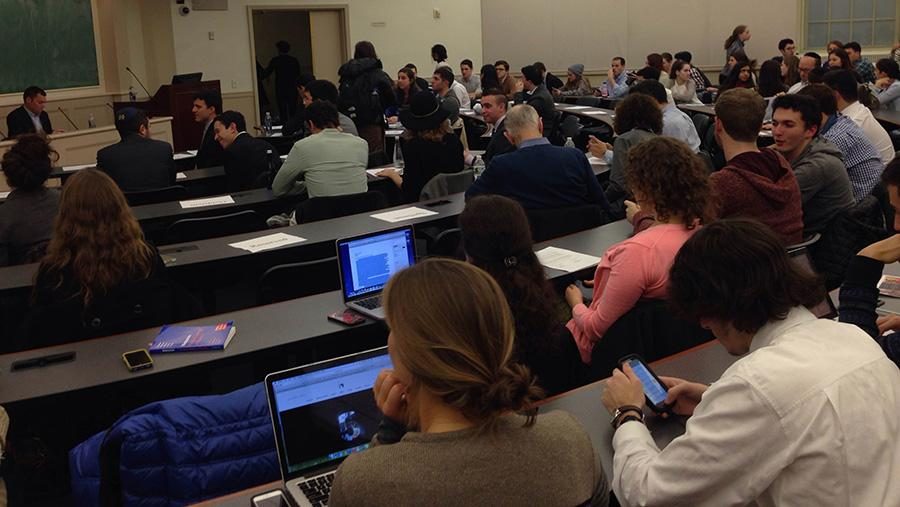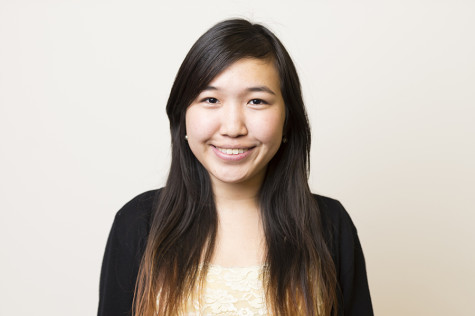Policy experts debate Israeli-Palestinian conflict
TorchPAC organized a debate regarding Israel and the Modern Middle East on Thursday.
November 14, 2014
The reason for failed agreements between Israel and Palestine, the use of boycotts and America’s position in the Middle East conflict were debated at an event sponsored by NYU TorchPAC. Atlantic editor and CUNY professor Peter Beinart represented the liberal zionist side, and executive director of the Emergency Committee for Israel Noah Pollak represented the conservative zionist side.*
The debate, co-sponsored by Hillel at NYU, Justice & Unity in Mideast Policy, J Street U NYU, Gesher, NYU College Democrats, NYU College Republicans and NYU College Libertarians, took place at NYU School of Law’s Vanderbilt Hall on Nov. 13.
Beinart spoke about his frustration over the lack of a positive and sustained agreement between Palestine and Israel.
While Pollak acknowledges the lack of resolution, he said he believes it is because Palestinians do not appear to desire one.
“If Palestinians acted like Canadians, there would’ve been a Palestinian state a long time ago,” Pollak said. “The lack of a Palestinian state is not because of Israel.”
Beinart disagreed, citing public polling data.
“The most prominent Palestinian pollster did a poll that showed a large majority of Palestinians favor a two-state solution,” Beinart said.
The debaters also discussed the topic of BDS — boycott, divestment and sanctions.
“I do oppose boycotting,” Beinart said. “I don’t think it’s consistent with a two state solution — it’s hostile to Israel. I want a democratic Israel, a homeland for the Jewish people and offers of citizenship and the right to vote.”
Pollak agreed, but said he believes BDS tactics were extremely hostile.
“The organized boycott movement should be renamed the Destroy Israel Movement,” Pollak said. “BDS disrupts events and engages in violence against Jewish students on campuses.”
Beinart and Pollak also discussed why the ongoing conflict was significant to Americans.
“Alliances help America’s prestige,” Pollak said. “If you want something from Israel you have to come to the White House calling for it. America should promote a liberal international order, rogues should fear challenging us and friends should want to be part of that alliance.”
Beinart agreed that the audience should care, but said he worries the United States is creating a bad reputation for itself by being an ally to Israel.
“We are supporting West Bank, which is an immoral area,” Beinart said. “10 Palestinians can’t congregate without Israeli permission, even in private homes.”
CAS sophomore Wenbo Wang said he benefitted from the debate’s depth.
“Overall, I like that the event let us go in-depth rather than on the surface,” Wang said. “I agree more with Peter [Beinart], in terms of security and the two-state solution, but I like how Noah addressed a diversity of issues.”
Steinhardt sophomore Zoe Siegel said she was conflicted, and Beinart’s points made her think about her stance on the conflict.
“I think I’m pro-Israel, but it goes up and down because I don’t know enough information,” Siegel said. “I would like to say I was more on Peter [Beinart’s] side. I think we need to look at more than just one side of the equation, and I liked how he related past events to present day.”
Email Christine Wang at [email protected].
*Correction: an earlier version of this article mistakenly reported that Peter Beinart represented the pro-Palestine side. WSN regrets this error.




























































































































































